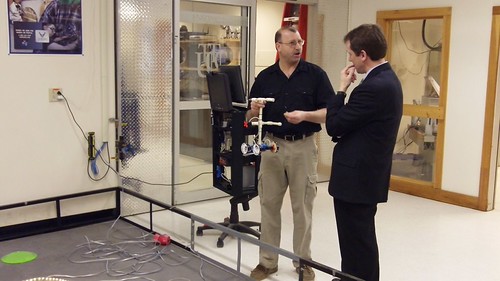Students apply math and science skills in classes they find relevant at United Technologies Center in Bangor.

BANGOR — The students who attend United Technologies Center are engaged in their work, and they finish high school with skills that immediately qualify them to work on construction sites, at auto dealerships, in hospitals and elsewhere.
It can also give them a leg up if they go on to college. More than three quarters of them do, and most of those students graduate from college.
Maine’s largest vocational education center was the first stop for Education Commissioner Stephen Bowen on Thursday, the second day of his statewide listening tour.
Bowen toured the school, met with Penobscot- and Piscataquis-area superintendents and ate a lunch with teachers prepared by students in the United Technologies Center culinary arts program.
United Technologies Center — which accepts students from more than 30 communities — partners with area businesses to train their future employees. In exchange, car manufacturers donate vehicles for students to work on and John Deere donates front-end loaders for students to operate.
“If we say, ‘We want a blank,’ it arrives because we produce their workforce,” Center director Fred Woodman told Bowen.
The students in John Milligan’s construction classes operate like a construction crew. One student is the foreman; another is charged with overseeing safety. Crew members put together bids for jobs and follow through.
Last year, Milligan’s students performed more than $400,000 worth of community service construction work.
Bowen had a chance to see several other initiatives in action at the United Technologies Center:
- The students in Valerie Clapp’s computer design classes graduate from the program with college credits and work experience. The United Technologies Center has an articulation agreement with the Boston University Center for Digital Imaging Arts, allowing students to jump right into the college level. Design students also have a chance to perform graphics work for an Auburn firm that needs the assistance, Clapp said.
- Ritchie Palmer’s emergency medical services classes offer students a chance to apply some of the chemistry and anatomy knowledge they pick up at their home high schools. At the technical center, Palmer said, it starts to make sense because it’s relevant. Students graduate from the EMS program and are sought after by area fire departments. “The thing with public safety,” Palmer said, “you’ve got to know a little bit about everything.”
- Most of the teachers at United Technologies Center bring industry experience to their teaching jobs. Many continue running their own businesses on the side. “It keeps you sharp,” said Milligan, who supervised projects for Sargent Corporation before joining the technical center. “It keeps you on top of things.”
- More and more, students are arriving at United Technologies Center with less hands-on experience from shop classes, said Frank Dumond, who teaches automotive diagnostics. That’s because budget cuts in recent years have often targeted shop classes first.
“Vocational education at the high school level has sort of been pushed to the back burner,” Bowen said.
But the vocational centers play a critical role in educating Maine’s workforce, Bowen said. “There are kids who are getting job skills and going right out into the market or going to college.”
Resources and more information
- Fred Woodman, director
United Technologies Center
207-942-5296
fwoodman.utc@gmail.com - Career and Technical Education in Maine
